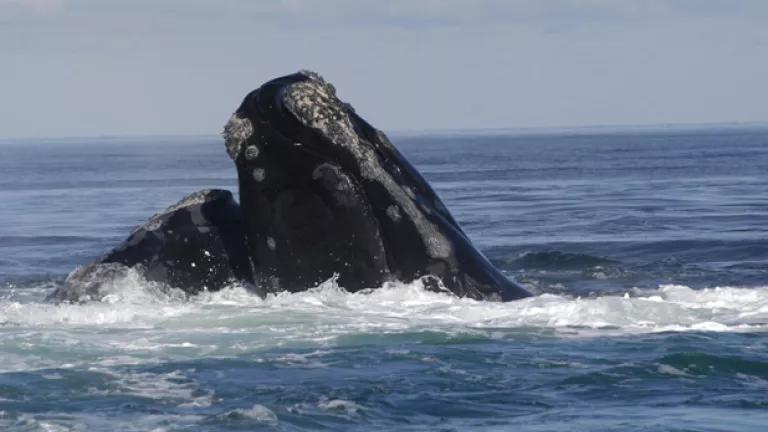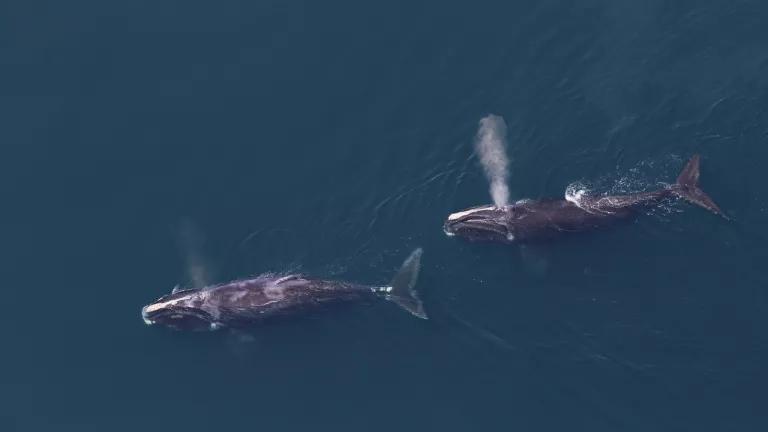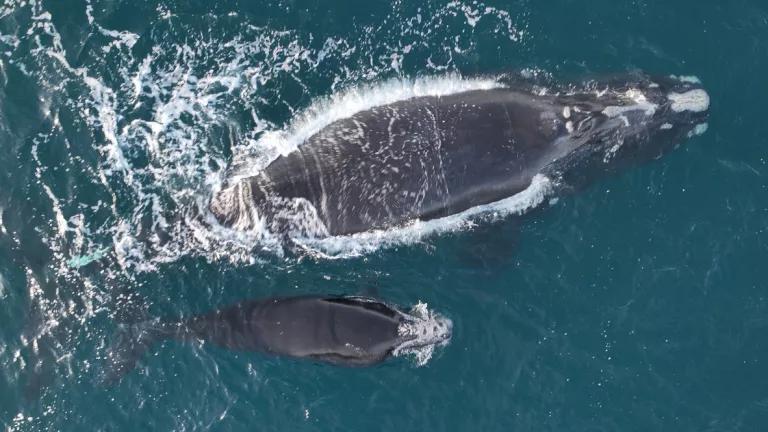
The Gulf of Maine is an important habitat for North Atlantic right whales, but the waters also pose a serious risk of entanglement in lobster gear.
The Marine Stewardship Council (MSC)—a major seafood ecolabel—suspended its certification of Gulf of Maine lobster due to the risk the fishery poses to critically endangered North Atlantic right whales.
People are increasingly concerned about the sustainability of their seafood—where it comes from, how it was caught, what environmental impacts may result, and what human rights may be being violated.
With this increased interest comes an increasing reliance on seafood ecolabels, which offer a fast and easy way to identify which fish or shellfish to choose as we’re racing around the grocery store with the kids or struggling through our commute home from work. We as consumers must be able to trust those ecolabels if they are to retain their value as a tool that help us make sustainable choices.
The decision made by the Marine Stewardship Council (MSC)—arguably the best recognized sustainable seafood certification program—to suspend its certification of Gulf of Maine lobster due to the risk the fishery poses to critically endangered North Atlantic right whales is an important step towards regaining that trust.

A dead right whale, recovered off Boothbay/Portland, Maine in September 2016, showing evidence of entanglement around the head and through the mouth.
Entanglement in vertical buoy lines associated with pot and trap fishing gear, such as those used by the Gulf of Maine lobster fishery, is the leading cause of death, serious injuries, sublethal impacts, and overall decline of North Atlantic right whales.
Entanglement is also a serious animal welfare concern. As illustrated by the harrowing story of Snow Cone, the right whale mom who miraculously gave birth while severely entangled only to be seen several months later emaciated, covered in lice, dragging even more gear, and sadly without her calf. Snow Cone will almost undoubtedly succumb to her injuries.
Shocked, then, may be a consumer of Gulf of Maine lobster—a seafood product previously clearly labelled as sustainable by the MSC—to learn that the fishery poses an outsized risk of entanglement to North Atlantic right whales in U.S. waters, and that the fishery management measures intended to reduce the risk of entanglement are inadequate and severely limited in their effectiveness.
If our purchase of lobster labelled as “sustainable” may have been hastening the demise of one of world’s most iconic and endangered marine mammal species, how can we trust if other similarly labelled seafood is truly sustainable?

Right whale "Snow Cone" shortly after giving birth to her calf while entangled. Snow Cone has since likely succumbed to her injuries and her calf has been lost.
The certification of Gulf of Maine lobster as sustainable has, in fact, been under scrutiny for several years because of the risk the fishery poses to the North Atlantic right whale.
MSC temporarily suspended its certification of the Gulf of Maine lobster fishery in 2020 when a federal judge ruled that the U.S. government had violated the Endangered Species Act in authorizing the fishery. The certification was reinstated in October 2021 after the development of new management measures but, in 2022, a federal court again ruled that NOAA Fisheries had violated the Endangered Species Act and the Marine Mammal Protection Act when it issued the biological opinion and final rule that determined those new measures. The court has since upheld that decision following a challenge by the Maine Lobstermen’s Association and its allies.
In June of this year, NRDC, alongside the Animal Welfare Institute and Defenders of Wildlife, formally objected to a determination that the American lobster fishery—of which the Gulf of Maine lobster fishery is a part—should be recertified to the MSC sustainability standard on the grounds that the fishery threatens North Atlantic right whales.
The Monterey Bay Aquarium Seafood Watch program—another well-known seafood ecolabel—recently issued a science-based recommendation that consumers should avoid purchasing American lobster caught in the U.S. and Canada, snow crab caught off Canada’s Atlantic coast, and several other fisheries, based on the same concerns.
Seafood Watch’s decision followed a recommendation to avoid American lobster issued by WWF-Hong Kong, following the listing of North Atlantic right whales as critically endangered by the International Union for Conservation of Nature (IUCN). Bycatch and entanglement in lobster fishing gear were identified by IUCN as key threats to the species.
Conservation groups based in Georgia also launched a lobster boycott effort after a 12-year old right whale named Cottontail was found dead off South Carolina after becoming severely entangled around the mouth and upper jaw.

Ropeless fishing systems protect whales from entanglements and enable fisheries to operate sustainably.
The suspension of the certification of Gulf of Maine lobster by MSC follows the law and the science. The MSC standard requires that management strategies for fisheries are designed and expected to achieve national objectives for the protection of endangered species. The outcome of the federal court rulings indicate that this is not the case for the regulations applied to the Gulf of Maine lobster fishery, meaning it no longer meets the MSC sustainability standard.
The suspension may have negative economic consequences for the fishery in the near-term and valid concerns are being expressed by the fishing community in that regard. Thankfully entanglement is a conservation issue we can solve. The Gulf of Maine lobster fishery has an opportunity to potentially regain its certification as a sustainable seafood choice in the future by advancing ropeless fishing systems. These innovative technologies have the potential to eliminate vertical lines from the water, allowing fisheries and marine species vulnerable to entanglement to coexist. Ropeless fishing systems are already opening up areas previously closed to fishermen in order to protect right whales in the Southeast U.S., and are gaining increasing interest from Maine lobstermen.
Ropeless fishing systems will also enable consumers to feel fully confident in their sustainable seafood choice. MSC and other seafood ecolabels, as well as buyers and retailers of sustainable seafood, should do their part to economically support fishing communities in the transition to these new technologies, and help develop a sustained and profitable market for seafood fished using ropeless fishing systems.
MSC’s decision to suspend the certification will help ensure that we as consumers will feel confident in buying and paying a premium for Gulf of Maine lobster again in the future, when the fishery has been determined to be entanglement-free by ecolabels we can trust.




